Christ is risen! Truly He is risen!
This is a contemporary Coptic Orthodox icon.
The Samaritan Woman
This is one of my favorite Gospel stories. It makes me smile.
Because:
1 The dialog is written so beautifully. It makes me wonder if  the Apostle John was a frustrated dramatist.
the Apostle John was a frustrated dramatist.
2 I can see a quiet gleam in the Lord’s eyes as He so cleverly, so carefully “works” this Woman, so to speak, leading her higher and deeper – all unknowing to her till the end.
3 And thereby we see how He is doing the same with us – have you noticed? If not, you will. We’ll come to that.
4 Also, so much fine teaching is crammed into this short story.
But first…
A Short Reprise
In his Gospel account John included a number of stories not found in the other Gospels. My guess is that he, writing several decades after the other Evangelists, thought these were just too good to be lost.
As we Orthodox travel through John’s Gospel during Pascha, I think the Fathers chose these particular Sunday Gospel readings because they apply so directly to each of us. As follows:
The Second Sunday of Pascha: Like Thomas, we all need to overcome our doubts.
The Third Sunday of Pascha: From the Myrrhbearers, Joseph of Aramathaea and Nicodemos we learn mercy, love, duty.
Last Sunday: Like the Paralytic we all are paralyzed in one way or another. Christ can raise us up.
Today: The Woman of Samaria
Next Sunday: Each of us is the Man Born Blind – which I’ll leave you to ponder till then.
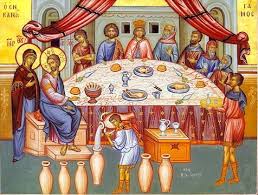 But before we proceed, I have a complaint. The story of the Wedding in Cana of Galilee is read on the Second Monday after Pascha. I hope I won’t be struck dead for saying this, but To whoever of the ancient Fathers chose our Pascha readings: This story is so sweet, so captivating, and so beautifully illustrates the kindness of Jesus, and the relationship between Him and His Mother. Why ever did you put it on a Monday when hardly anybody is in church to hear it? Big mistake.
But before we proceed, I have a complaint. The story of the Wedding in Cana of Galilee is read on the Second Monday after Pascha. I hope I won’t be struck dead for saying this, but To whoever of the ancient Fathers chose our Pascha readings: This story is so sweet, so captivating, and so beautifully illustrates the kindness of Jesus, and the relationship between Him and His Mother. Why ever did you put it on a Monday when hardly anybody is in church to hear it? Big mistake.
………………………………….. (pause)…………………………………..
Well, I’m still alive as of now, so let’s continue. If this Post stops abruptly in the middle, you’ll know what happened.
Maybe next year I’ll do a Post on that story.
Now on to Christ and the Woman of Samaria.
Gospel: John 4:5-42
The Contact
Jesus and His disciples were traveling through Samaria, north of Jerusalem, 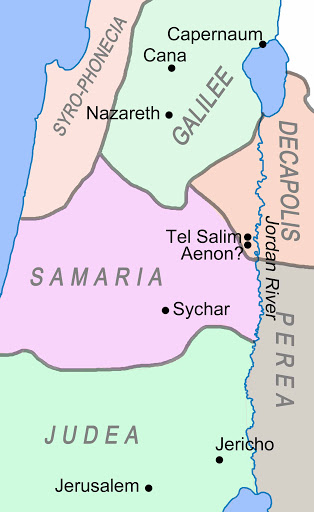 on the way to Galilee. Now, good Jews did not go through Samaria. Jews despised Samaritans, lower class heretics, so much that they wouldn’t even talk to them. They traveled miles out of their way, west along the sea or east along the Jordan in order to avoid…uck… Samaritans. Jesus and His disciples – probably wondering “What in the world are we doing here?!” – stopped in Sychar, near Jacob’s well. The disciples went into town to get lunch. Jesus remained behind – and maybe John, too? This might explain why he’s the only Gospel writer to report this story.
on the way to Galilee. Now, good Jews did not go through Samaria. Jews despised Samaritans, lower class heretics, so much that they wouldn’t even talk to them. They traveled miles out of their way, west along the sea or east along the Jordan in order to avoid…uck… Samaritans. Jesus and His disciples – probably wondering “What in the world are we doing here?!” – stopped in Sychar, near Jacob’s well. The disciples went into town to get lunch. Jesus remained behind – and maybe John, too? This might explain why he’s the only Gospel writer to report this story.
At Noon a woman came to draw water. Tradition said it was at Noon that the serpent began to tempt Eve. Now comes a reversal. Jesus said to her “Give me a drink”. She anwered “Why do you, a Jew, speak to me, a Samaritan woman?” Because Jewish men did not strike up conversations with Samaritans. But Jesus did.
Below: the well at Sychar today.
And also certainly not with women. As one Jewish morning prayer goes: 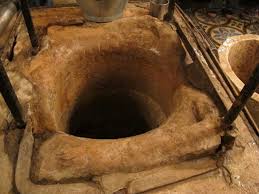 “Blessed are you, Lord our God, ruler of the universe, who have not created me a woman.” I’ve wondered if maybe that originally meant: Thank God I don’t have to carry and give birth to children. I admire women immensely for doing that. No matter, men have used it as a “putdown”. And so good Jewish men did not associate with women. But Jesus did.
“Blessed are you, Lord our God, ruler of the universe, who have not created me a woman.” I’ve wondered if maybe that originally meant: Thank God I don’t have to carry and give birth to children. I admire women immensely for doing that. No matter, men have used it as a “putdown”. And so good Jewish men did not associate with women. But Jesus did.
Nor with sinners. “Why does your Teacher eat with tax collectors and sinners?” Matthew 9:11 He even called a few of them to follow Him and made them leaders of His Church. The Apostle Matthew the tax collector who had collaborated with the enemy. Simon the Zealot who may have been a political revolutionary. Paul who had persecuted Christians. This Samaritan Woman who is now titled “Equal to the Apostles”. And you and me who are “the chief of sinners” – or at least that’s what we call ourselves at every Divine Liturgy. “For I have not come to call the righteous, but sinners to repentance.” Luke 5:32 Good Jews wouldn’t touch them. But Jesus did.
This is part of what the story of the Samaritan Woman teaches us.
In addition, the Lord obviously saw in her someone who had great possibilities – for remember that “He knew what was in a man”.John 2:25 And within a Woman, too.
So now He begins to work on her.
The “Come On”
The Woman has come to get water. He starts with her where she is: “Give  me a drink.” She is startled for reasons we gave above. He’s got her attention. He proceeds: “If you knew what God can give you and who I am, you would have asked me to give you living water”. She has no idea what he’s talking about. “Sir, you don’t even have a bucket. Do you think you’re greater than our father Jacob who gave us this well?” Yes, He does. And He is.
me a drink.” She is startled for reasons we gave above. He’s got her attention. He proceeds: “If you knew what God can give you and who I am, you would have asked me to give you living water”. She has no idea what he’s talking about. “Sir, you don’t even have a bucket. Do you think you’re greater than our father Jacob who gave us this well?” Yes, He does. And He is.
Startled. Perplexed. This is often our reaction when God begins to work on us. It certainly was with me when God first made His move on me. And we don’t “get it”. What we’re interested in is material gain, getting ahead, power, advantage, whatever. Lord, I want that toy for Christmas. Or later: I would like you to get me that woman, or that job, or… And also, who do you think you are? Do you think you’re greater than Santa Claus? or Dow Jones? or “Ask Amy”?
He goes deeper.
“Whoever drinks of this water will thirst again. But the water I give will be a fountain welling up eternally.” I can give you never-ending refreshment. He means the Holy Spirit. He’s got her interest now. Imagine how this would sound to someone who had to walk a ways out of town, then draw water with a bucket and carry it back. “Sir”, says the woman,  “give me some of this water”. I don’t know who you are or how you could do it, but this sounds wonderful, especially in this noonday heat.
“give me some of this water”. I don’t know who you are or how you could do it, but this sounds wonderful, especially in this noonday heat.
Keep in mind that to the Woman He’s just a passing stranger. She has no idea who He is. God strikes up extended conversations with people, speaking to us in our heart and mind, speaking to us through the people around us, planting desires and hopes in us, long before we know who He is or what He’s up to.
He makes her squirm.
Now that He’s got her attention, and she’s getting interested, He hits her where it hurts. “Go, bring your husband and come here”. She says: “Sir, I  have no husband”. He answers (I paraphrase): You said that right. You’ve had five husbands *, and now you’re just living with some guy! She gasps. This is getting personal. This man knows too much. “Sir”, she says, rather in a panic, wondering what else He knows, “I perceive that you are a prophet.”
have no husband”. He answers (I paraphrase): You said that right. You’ve had five husbands *, and now you’re just living with some guy! She gasps. This is getting personal. This man knows too much. “Sir”, she says, rather in a panic, wondering what else He knows, “I perceive that you are a prophet.”
- One must at least admire her idealism and tenacity. She kept thinking surely the next one would be better. Dear women readers, learn from the Woman of Samaria. Probably he won’t be.
You see, when we start to get seriously interested in Christ and what He can give us, He quickly begins to show us what this will cost us. This will not come easily. We will have to overcome our sins, our failings. For, though most of us don’t know it at the first, He has come to change us, how we live, how we think, even how we feel – and usually we don’t really care for that.
She tries to divert Him.
The Woman of Samaria attempts to get the subject off herself and onto… How about Religion? Religion is always a good safe holy topic. Should we worship on this hill or that hill? Let’s talk about theology, or how we should hold our fingers when we make the sign of the Cross, or the development of Christian social teachings or of liturgy or of theology. Good important things in and of themselves, but they can also be used as a diversion from what God has in mind: the development of me. Too many people lose themselves in Religion and never get around to the Real Thing.
But since He is a “prophet”, she does ask a serious religious question: “Our 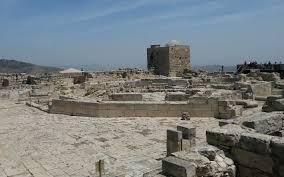 fathers worshiped on this mountain. Right: Mount Gerizim, where Samaritans still worship You Jews say sacrifices should be made on Mount Zion.” Who’s right? He gives a straight answer, but one which doesn’t please her: We Jews are right. “Salvation comes from the Jews” – as indeed it did; Christ came from the
fathers worshiped on this mountain. Right: Mount Gerizim, where Samaritans still worship You Jews say sacrifices should be made on Mount Zion.” Who’s right? He gives a straight answer, but one which doesn’t please her: We Jews are right. “Salvation comes from the Jews” – as indeed it did; Christ came from the  Jews. “But the time is coming when true worship will be on neither mountain… when God will be worshiped in spirit and in truth.” Indeed. For nearly 2000 years now, the One True Sacrifice has been offered in churches all over the world, where we call down the Holy Spirit. The woman does not understand – little wonder. But what she does understand she doesn’t like: He had just told her that she and her people were wrong. Likewise when He first comes to us and shows us that we have been wrong… ?
Jews. “But the time is coming when true worship will be on neither mountain… when God will be worshiped in spirit and in truth.” Indeed. For nearly 2000 years now, the One True Sacrifice has been offered in churches all over the world, where we call down the Holy Spirit. The woman does not understand – little wonder. But what she does understand she doesn’t like: He had just told her that she and her people were wrong. Likewise when He first comes to us and shows us that we have been wrong… ?
She pulls back. “When the Messiah comes he’ll explain this.”
He strikes!
“I WHO SPEAK TO YOU AM HE.”
All this time you have been speaking with God in the flesh.
And suddenly she begins, only begins, to see Him for who He is. He has led her on, step by step, till she is now at the edge of true Faith. She runs into town: “I think I’ve found the Messiah.”
An Interlude: Now the Disciples don’t “get it”.
The Disciples return with lunch to find that Jesus has more important things on His mind. “I have food to eat of which you know not.” This has been spiritual food for him: He is exulting:.He sees Jews, Samaritans, Gentiles, all mankind ripe for harvest. He is feasting on the whole world brought to salvation. The disciples say: He doesn’t want to eat. Has someone else brought him lunch? (Duh…) You’ve got to wonder how Jesus had the patience. He had only three years to work, and people so slow.
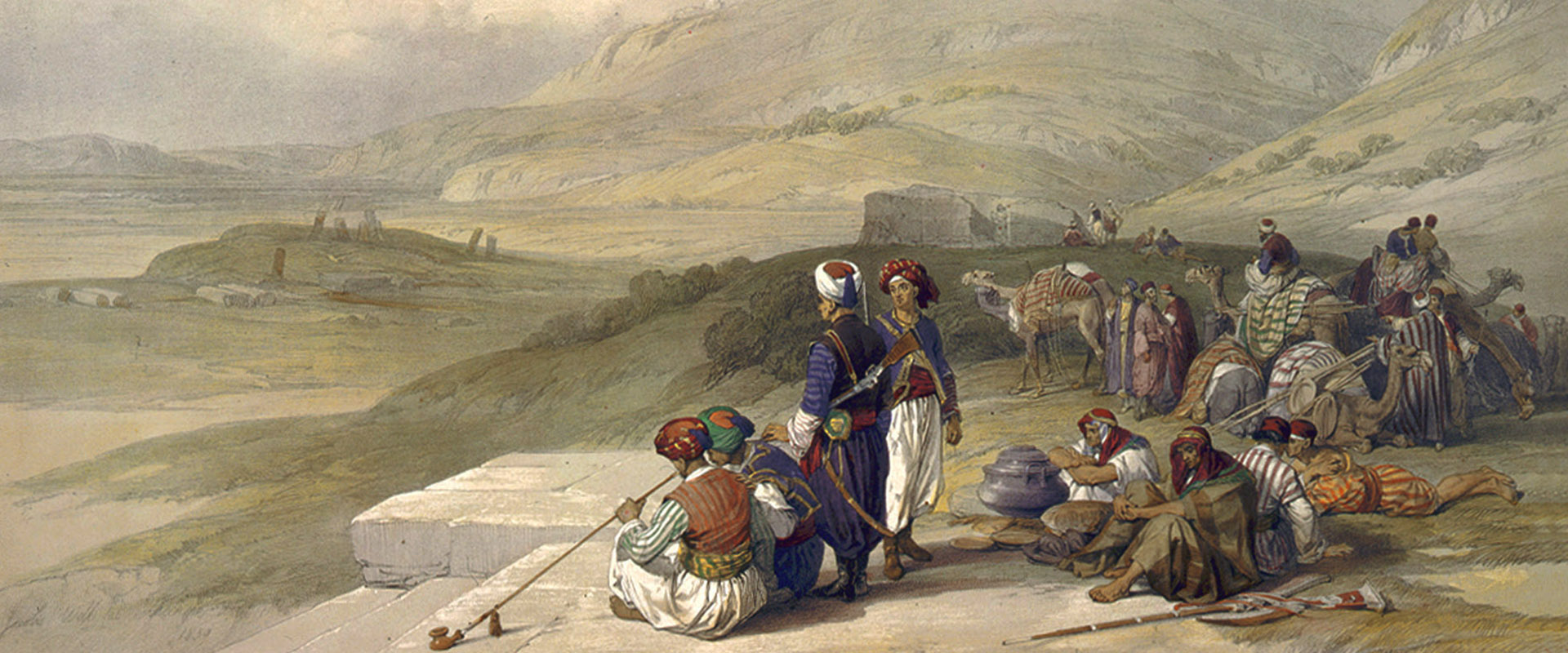 They don’t yet understand Him and His glorious Mission. The Gospel accounts tell how again and again they failed – and how patiently – well, sometimes He got frustrated – He led them also step by step. At this point they seem to be even slower than the Samaritan woman, don’t they? She got it in a few minutes, but it took them years. Sometimes it takes religious people longer to catch on to what this is really all about, who He really is. (I know of a man born Orthodox, the Council chairman, who one Sunday heard his Priest preach about the divinity of Christ, and came up to him after Liturgy and said very sincerely, “Jesus is God? I never knew that. Tell me more.” And far more of us fail for a long time to absorb the fact that He has come to remake us in His image. But I don’t want to be changed…
They don’t yet understand Him and His glorious Mission. The Gospel accounts tell how again and again they failed – and how patiently – well, sometimes He got frustrated – He led them also step by step. At this point they seem to be even slower than the Samaritan woman, don’t they? She got it in a few minutes, but it took them years. Sometimes it takes religious people longer to catch on to what this is really all about, who He really is. (I know of a man born Orthodox, the Council chairman, who one Sunday heard his Priest preach about the divinity of Christ, and came up to him after Liturgy and said very sincerely, “Jesus is God? I never knew that. Tell me more.” And far more of us fail for a long time to absorb the fact that He has come to remake us in His image. But I don’t want to be changed…
Back to the Samaritan Woman
It worked! Because of the Woman many villagers believed; they came out to see Him, and He stayed a while with them – with Samaritans. When the good people of Jerusalem heard about it, they must have been appalled, simply appalled!
 Tradition says the Samaritan Woman brought her children to Faith and most of her relatives. (I wonder how many children she had by how many husbands or whatever? which kid by which husband? Maybe even she couldn’t remember.) But she changed her life. He changed her life. After the Resurrection she was baptized taking the name PhotinI, (PHO-ti-EE) φωτονία, Light. The story says she was sort of a natural-born evangelist. She couldn’t stop telling people about Jesus, this amazing Man she had met by Jacob’s well.
Tradition says the Samaritan Woman brought her children to Faith and most of her relatives. (I wonder how many children she had by how many husbands or whatever? which kid by which husband? Maybe even she couldn’t remember.) But she changed her life. He changed her life. After the Resurrection she was baptized taking the name PhotinI, (PHO-ti-EE) φωτονία, Light. The story says she was sort of a natural-born evangelist. She couldn’t stop telling people about Jesus, this amazing Man she had met by Jacob’s well.
She and her family wound up in Carthage in North Africa, bringing many to Christ wherever she went. But her enthusiasm finally got her into trouble. One of her sons Victor was in the military and was imprisoned in Rome because he was a Christian. So Photini took some of the family and went to the Emperor Nero himself and demanded Victor’s release. (Some advice: Never catch Nero on a bad day.) He had them all executed. One account says Nero had Photini thrown down a well, thinking that would be a clever and ironic thing to do. It sounds like him.
The Martyr Photini, Holy Photini, an image of what Christ can make out of us ordinary people If we let Him. He can lead us onward and upward step by step through life. He can take you and me, sinners that we are, shallow as we are, unperceiving as we are, imperfect as we are, and make us holy, change us into saints.
Next Week: The Man Born Blind
Week after Next: The Ascension

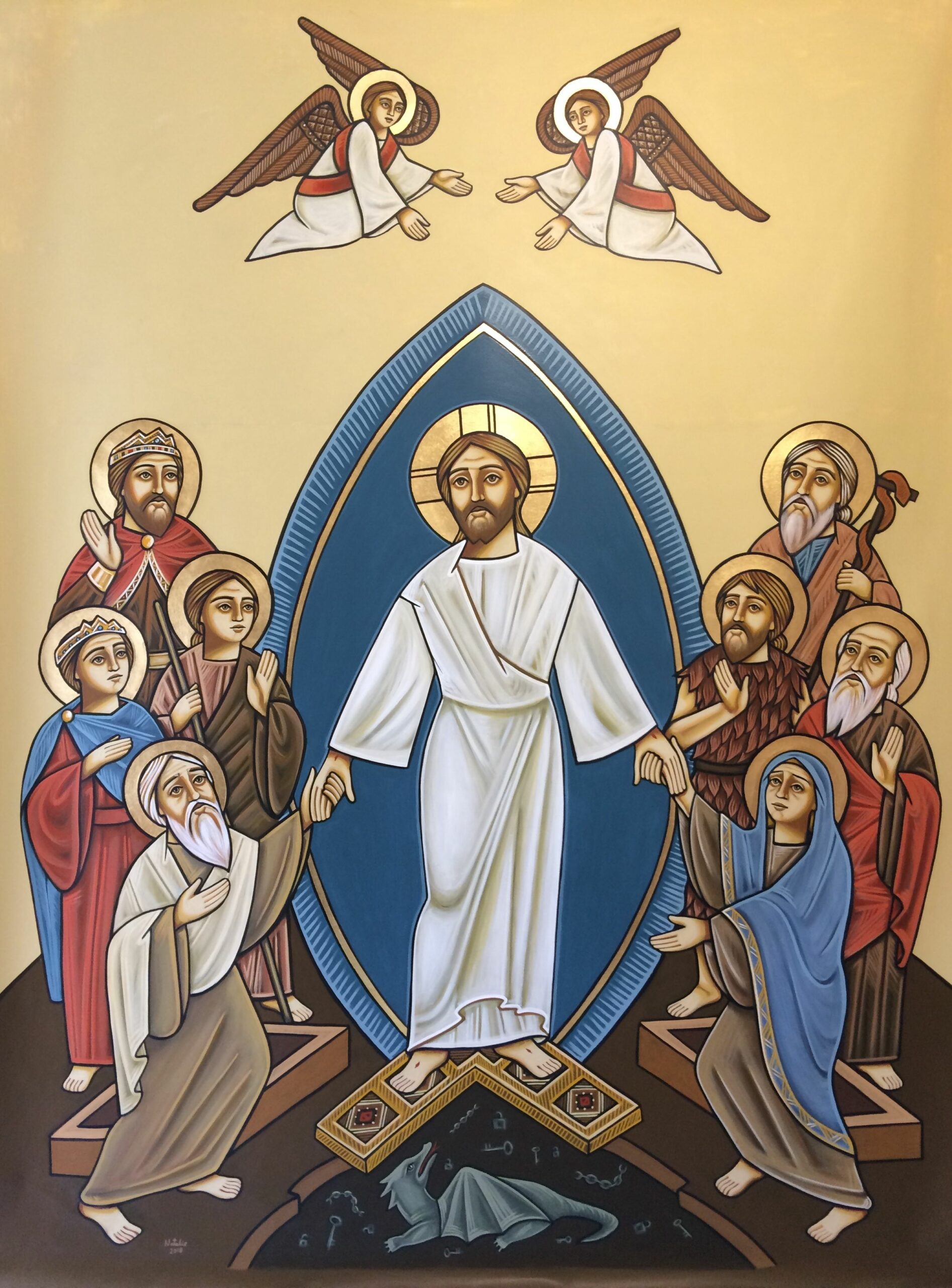
Father Bill,
Love changes everything!
Even a sinner like me, last night I realised that He has changed me, and I didn’t even notice, until he showed me what He had done in me. I had no idea of how deep He can work within us, in secret, like He did with the Samaritan woman. Amazing!
Love really changes everything, praise be to our God!
Father Bill,
Thank you for your teaching about the Samaritan woman, Photini. Amazing. Wow! I learned something new about her life . Thanks to the distractions of today’s 24 hour news and my own deliberate methods, I am sure, often enough, that I am as slow and frustrated as the disciples as when they heard the truth or questioned a different direction. In my quiet prayer time and reading, I sometimes reflect, about my own misguided thoughts or actions. I wonder about how often I may have missed the ‘living waters’ because I thought I knew a better route around my perceived Samaria.
You’re welcome, Stuart. Yes: Christ sometimes turns our ways of thinking and acting upside down. That can be TOUGH! Believe me. I wonder: Is that why some people keep running all the time, have the TV on all the time? Because they’re afraid to get quiet and let Him into their lives?
This is so good, so sweet and funny and true! Thank you so much!
(I’m glad you are still with us after “A Short Reprise” )
Father Bill, I am still smiling from reading your blog.
Thinking of the clueless disciples coming back from trying to find lunch, and reading that they were in Samaria for a couple of more days, I’ve always imagined them baffled, trying all that time to find out what happened at the well. I always wonder if John or Peter or one of the other disciples had the chance and courage to ask her at that time, or if they had to hear what happened through some of the men, and perhaps John went back sometime after the Resurrection and talked to her. Wouldn’t it be great to have these details? To know when they finally “got it”.
Maria, I think you’re treating the Gospel stories just as they should be treated, using your imagination on them. I don’t mean the Western Ignatian method of meditation, which consists of trying to place ourselves in the stories and trying to imagine how WE would react and feel. But rather to treat the “participants” of the stories as real people, and try to imagine how and why THEY reacted and what they felt.